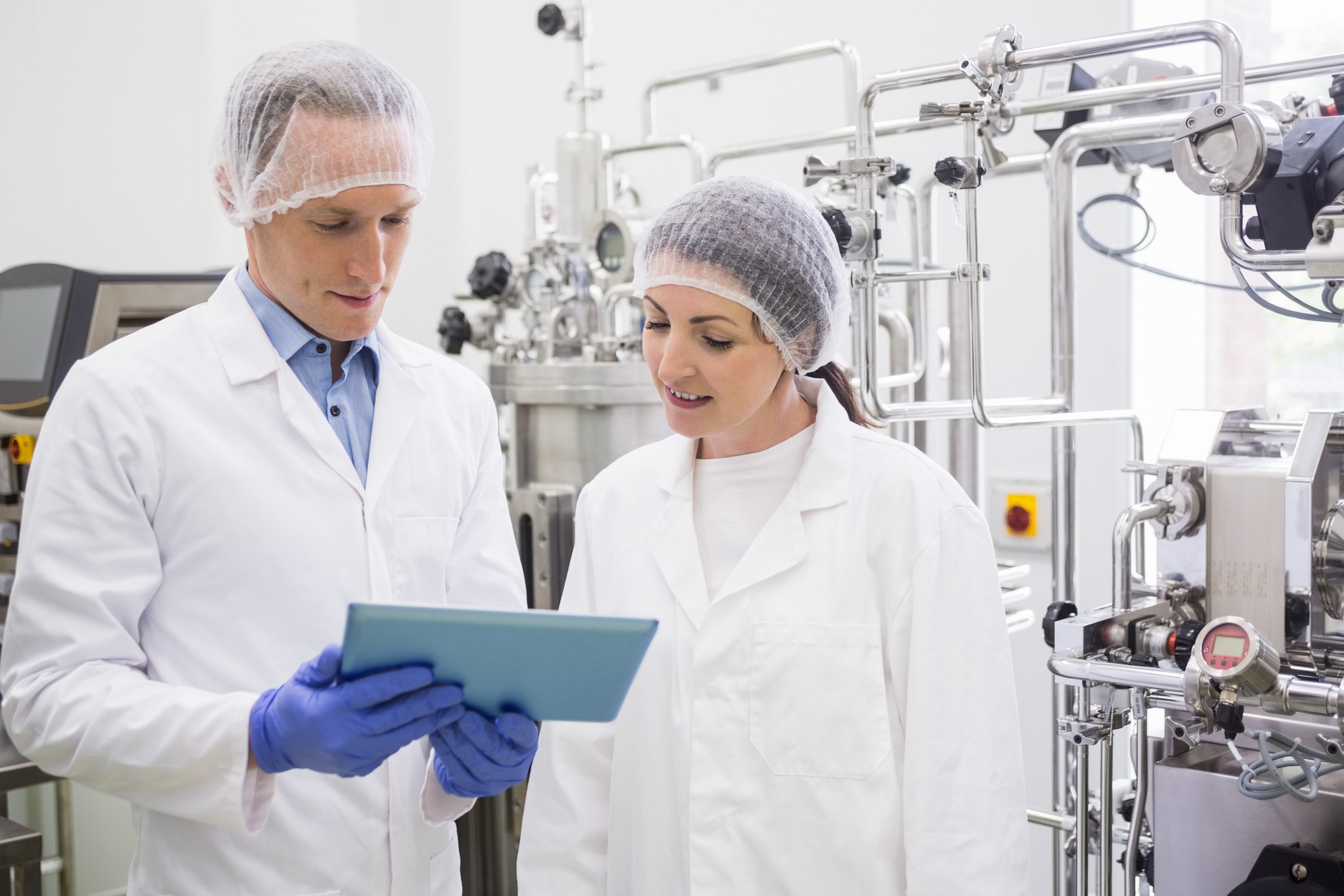Ensuring food safety and product quality is demanding and a continuous process that affects all levels of the food supply chain. A large part of their overall expenditures is used by the food industry to protect the consumer from contaminated or unsafe foods. Although these preventive measures are time- and resource-intensive, they are nevertheless an important component of daily business. For manufacturers, an effective management system is required to ensure food safety in order to prevent recall actions, increase productivity, and realize new business in a globalized market.
The assurance of food safety is the overarching goal of all players in the food industry. The standards are high and ubiquitous in the production of food. Food manufacturers invest a large part of their expenditure in efficient management systems to always be able to ensure food safety.
Fundamentally, two types of standards for food safety are distinguished: the statutory standards and regulations for food as well as private-sector standards.
Legally speaking, food manufacturers are only required to comply with the food safety regulations of those countries in which they produce. Obtaining internationally recognized food certifications through external auditing companies is optional.

The challenges in the management of food safety
Ensuring food safety is an intensive and continuous process. The implementation and maintenance of an effective food safety management system invariably require the investment of substantial amounts of time and money.
All international food regulations are based on the HACCP concept: potential hazards and critical control points are identified, and preventive measures to control and avoid risks to food safety are established.
How much a manufacturer should invest in food safety management systems depends on the scope of the food produced. Highly complex facilities with a large number of employees and diverse processing steps should mobilize more time and resources.
Time Invested in Food Safety
To ensure food safety, food companies invest a lot of time in appropriate measures. These include:
- Employee Training – All employees who come into contact with food during their workday receive an introduction to the guidelines for ensuring food safety. In addition to the certification of new hires, every employee must regularly participate in re-certification.
- Documentation and Record Keeping – From proper equipment cleaning to the materials used when in contact with food: most processes in food production are documented.
- Inspections – From receiving inspection through inline inspection to final quality control: food is checked multiple times along its journey through the supply chain. Different quality control measures are carried out at each stage.
- Hygiene and Cleaning – Facilities and all equipment built into them that come into contact with food are disinfected at regular intervals. All employees are required to adhere to strict hygiene protocols.
- Audits – They are necessary to obtain certification. Audits can span several months and involve extensive preparations, consultations, on-site visits, as well as follow-up communication.
- Validation and Verification – The introduction of a food safety management system is not enough: food manufacturers must also regularly demonstrate that their system works. Validation confirms that the chosen methods for food safety are effective for application. Verification, on the other hand, examines whether the implemented processes function as expected.
Money Invested in Food Safety
To reliably ensure food safety, financial investments are also required in:
- Certification – Obtaining and renewing certification by external auditors involves upfront costs. For an initial on-site audit, food manufacturers should expect expenses between 5,000 and 10,000 USD (travel costs are not included here). After obtaining certification, annual membership fees apply.
- Salaries – Many larger companies have a team responsible for management in the area of food safety.
- Technology – From advanced equipment for foreign object detection to automatic temperature controls to hygienically designed processing machinery: a large portion of the investment goes into the proper technology to reliably reduce the risk to food safety.
- Maintenance and Service of Equipment – To avoid malfunctions and unplanned downtime, equipment must be regularly maintained. If the performance of the machines used declines over time, food could be contaminated by foreign objects. Computer-based technologies must undergo regular software updates.

Food safety as an economic imperative
Despite the high initial and ongoing costs for regulatory compliance, food safety is crucial for the economic efficiency of a food manufacturer.
Food law – and the rigor with which it is enforced – varies regionally. Global leaders in the food industry therefore require all upstream and downstream partners to present certifications.
Aside from access to lucrative international markets, effective food safety management systems provide highly accurate data that increases productivity and prevents recalls.
Avoid Recalls
Although ensuring food safety is a time- and resource-intensive endeavor, the effort and costs are negligible compared to the consequences of product recalls.
Globalization and digitalization amplify the negative economic impact when contaminated food products enter the market. Conducting a recall is more expensive and challenging when products have been shipped worldwide. In addition, news of recalls now spreads much faster and more widely through social media and other digital channels.
Product recalls are catastrophic for companies in the food industry. In addition to the high costs associated with organizing and executing a recall, companies may also suffer potential major reputation losses due to the loss of trust, which is associated with long-term economic setbacks.
A food safety audit can help identify vulnerabilities in a production line. If these vulnerabilities are neglected, contaminated products could end up on consumers' plates. Food manufacturers can significantly reduce the likelihood of a recall through the following two measures: on one hand, by continually investing in advanced technology; on the other hand, through effective and transparent management systems to ensure food safety.
Gains Through Efficiency
Improving the food safety management system can achieve more for a manufacturer than merely obtaining certification. By implementing a modern and robust concept, manufacturers can also benefit from increased production efficiency.
Obtaining an internationally recognized certification requires the implementation of a careful protocol for the ongoing documentation and updating of the technology used to ensure food safety. When intelligent inspection devices meet strict documentation, valuable data can be collected.
By improving and expanding the use of devices for foreign object detection, food manufacturers gain more comprehensive insights into their production processes. In addition, food waste is reduced and every risk to food safety is reliably traced back to its source.
In times of crisis, an effective food safety management system makes it possible to quickly ramp up production capacity. If production must be rapidly increased to, for example, deliver basic foodstuffs, it can be scaled up in the interest of higher production. Compromises at the expense of product quality are not made.
Conclusion: What purpose do management systems for food safety serve?
The topic of food safety requires a number of preventive, but cost-intensive measures. For companies, the inevitable question arises as to the extent to which they can economically benefit from implementing the necessary standards.
Food safety management systems ensure that facilities for food production are equipped with state-of-the-art technologies and protocols to minimize the risk of contaminated products. From avoiding recalls to accessing international markets and increasing productivity: if food manufacturers modernize their production facilities according to international standards, they are better prepared for the economic challenges of the modern food industry.

